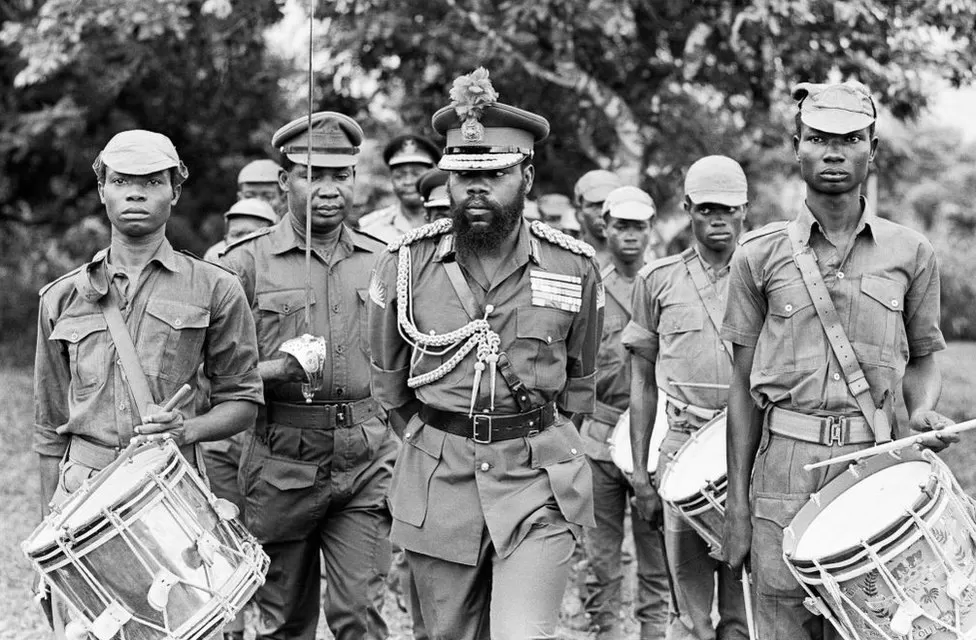The Role of UK, France, the US, and the Soviets in the Nigerian-Biafra War
Before delving into the ongoing global political dynamics between NATO and BRICS or discussing ECOWAS’ actions, it is crucial to reflect on the involvement of foreign governments and international bodies in the Nigerian-Biafra conflict. The war, which occurred between 1967 and 1970, was a tragic chapter in Nigeria’s history, leading to immense loss of life and destruction of cultural heritage.
The Nigerian federal military government, led by General Yakubu Gowon, opposed the secession of Biafra, fearing that it might lead to the disintegration of the nation. The Organization of African Unity (OAU), now known as the African Union (AU), supported Nigeria for similar reasons, as it aimed to prevent the destabilization of the entire continent by endorsing Nigeria’s territorial integrity.
UK’s Involvement: The United Kingdom, as Nigeria’s former colonial master, initially declared its support for Nigeria’s federal military government. Prime Minister Harold Wilson’s official response to the conflict was predicated on the fact that the UK would not stand for the break-up of its prized colonies, especially the ones it has worked hard to develop. However, later reports by Michael Leapman in The Independent (1998) uncovered a different stance. A cabinet paper from 1967 revealed that the UK’s decision to back Nigeria against Biafra was primarily driven by economic interests and oil competition. The British government aimed to bring the Nigerian economy back to a condition in which their substantial trade and investment could further develop. Moreover, despite official support from the UK government, many Britons, including journalists, writers, and activists, spoke against Wilson’s government involvement in the conflict, leading to media and public backlash and even threatening the British Labour government’s re-election.
US’s Involvement: The United States officially maintained a neutral stance during the Nigerian-Biafra War. However, the US provided military aid to Nigeria before President Lyndon Johnson left office in 1968. The cooperation with Britain was instrumental in supplying arms to Nigeria. On the humanitarian front, the US covertly supplied relief aid to Biafra through the Red Cross, showing a measure of sympathy towards the suffering people. Some African American civil rights leaders and Americans expressed dismay at the magnitude of human suffering in Biafra and implored the Nigerian government to treat the Biafrans with more humanity and end the food blockade, emphasizing the moral imperative of saving lives.
France’s Involvement: In July 1968, a year into the war, the French Council of Ministries released a statement of approbation in support of Biafra, expressing its sympathy for the Biafran cause. France, however, denied arming Biafra. Nonetheless, intelligence reports later confirmed that significant weapon shipments were reaching Biafra through two neighboring Francophone states, Ivory Coast, and Gabon.
Soviet Union’s Involvement: The Soviet Union supported Nigeria during the Nigerian-Biafra War. Moscow’s backing of the Nigerian federal military government was largely due to its desire to maintain influence in Africa and counter the West’s involvement in the region. The Soviets provided military assistance and weaponry to Nigeria.
Portugal’s Neutral Stance: Portugal, at that time led by the authoritarian Estado Novo regime under António de Oliveira Salazar, maintained a neutral stance in the conflict. They had a simple arrangement with Biafra – Biafran planes could land in Portuguese territory for refueling.
In the current global scenario, with tensions between NATO and BRICS, some countries, including the UK and the US, show interest in re-establishing relationships with ECOWAS and reinstating the ousted President of Niger. However, it is essential for Nigerians to be cautious and not become pawns in geopolitical chess games.
It has been decades since the war devastated millions of lives and obliterated significant cultural heritage in the Southeast. The UK government has expressed a willingness to partner with Ohanaeze Ndigbo to rebuild the region.
Moreover, Russia recently pardoned African debts, amounting to $23 billion dollars. President Putin also mentioned allocating an additional $90 million for similar purposes, emphasizing historical trade and finance connections between Moscow and Africa.
As we move forward, it is imperative for Nigerians to be discerning about foreign influences seeking to strengthen their influence in Africa. The wounds of the past should not be forgotten, and the focus should be on fostering peace, stability, and genuine partnerships for mutual progress. Rebuilding the nation and protecting cultural heritage should be paramount, and the people’s voices should be heard to shape a brighter future for Nigeria.
Please feel free to share or send us your thoughts and opinions via mail at theddi@madeinblacc.com or leave a comment below.
